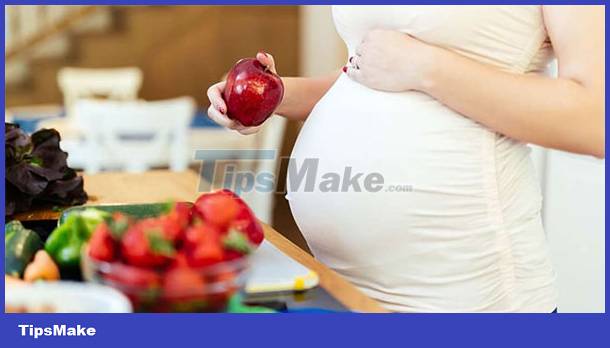Rules of eating during pregnancy
We all know how important it is to eat healthy, and now it's more important than ever when you're pregnant. Eating during pregnancy is very important for the development and formation of the baby. You still have to adjust your diet, even if you're still eating well.
 Eating during pregnancy is very important for the development and formation of the baby
Eating during pregnancy is very important for the development and formation of the baby
Pregnant women need to keep in mind the following rules of eating during pregnancy.
first
Adjust your diet even if you're still eating well
Most pregnant women need to increase protein content, some vitamins and minerals such as folic acid and iron, calcium. Limit fast food because it does not provide many calories. Eating better is not necessarily eating more. You only need to load about 300 Calories per day.
2
Do not eat salads, raw oysters and soft cheeses
You will need to stay away from raw seafood, unpasteurized milk or soft cheeses, and uncooked foods. All are sources of bacteria that can harm your unborn baby.
Some fish contain a lot of mercury, which is harmful to the brain of the fetus. Limit your intake of tuna, mackerel, and sea fish.
You should also not drink Cocktails. Using alcohol during pregnancy will cause physical complications, reduce the ability to learn and cause psychological problems for the child. It is advisable to give up alcohol completely during pregnancy.
Also do not drink beverages with caffeine. Drinking more than four cups of coffee a day can lead to miscarriage, low birth weight, and stillbirth. Caffeine can be found in tea, cola, cocoa, carbonated beverages and even chocolate.
Drinks such as fat-free milk, fresh fruit juice or filtered water with a slice of lemon should be used.
3
Start taking vitamin and mineral supplements
Vitamin supplements will ensure you get all the nutrients you need. Make sure Vtamin contains 600 - 800 Micrograms of Folic Acid. Deficiency of this B vitamin will lead to birth defects. In the later stages of pregnancy, you also need iron and calcium supplements. However, avoid overdose of vitamins and minerals, it can harm your child.
4
Do not diet during pregnancy
Dieting during pregnancy will be extremely harmful to you and your developing baby. Many weight loss diets will make you deficient in iron, folic acid and other important minerals and vitamins. Remember that weight gain is a good sign of a healthy pregnancy. Those who eat well and gain weight appropriately will give birth to healthy children.
5
Moderate weight gain
In general, you should gain between 11kg and 15kg if you started your pregnancy at the right weight. If you were underweight before getting pregnant, you should gain about 12kg to 18kg. Those who were overweight when they started, only need to gain about 6kg to 11kg.
When you gain weight is just as important as how much weight you gain. You should gain the least weight in the first trimester, about 1kg to 2kg, then gradually increase, and the most weight gain is about 0.5kg per week in the third trimester, when babies grow the fastest.
6
Eat small meals every 4 hours
Even if you're not hungry, your baby may be hungry, so eat every 4 hours. If you have vomiting, loss of appetite, heartburn or indigestion, you can eat 5 to 6 smaller meals instead of the usual 3 large meals. But never skip a meal. Even if you're not hungry, your child still needs regular supplements.
7
Occasionally add sweets
Processed foods, snacks, and pastries shouldn't be on the menu, but you don't have to give it up completely. You can try some delicious treats without harm, like banana cake, fruit ice cream, yoghurt biscuits. Eating sweets from time to time is not harmful to your baby.
You should read it
- ★ As a busy person, don't skip the 9 simple 'healthy but healthy' eating principles below!
- ★ 5 delicious but harmful foods, should not eat much
- ★ Eating disorders can cause serious health problems
- ★ To stay healthy by eating, you must adhere to the formula '4 less, 4 more'
- ★ Warning signs of your body eating too little vegetables